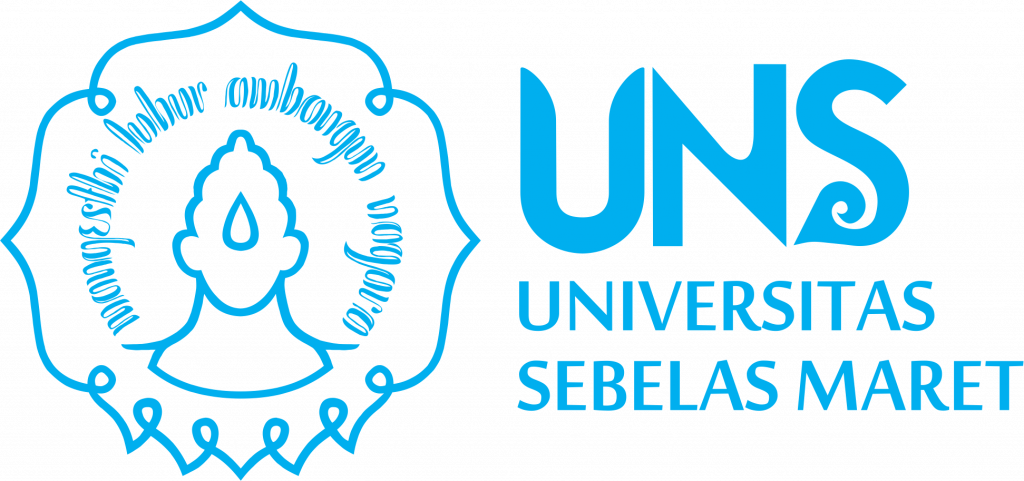Master PROGRAMME
Mechanical Engineering
Master Program in Mechanical Engineering, Faculty of Engineering, UNS, was established in 7 December 2009 based on the decree of Dirjen DIKTI No. 2331/D/T/2009. This master program is one of study program in UNS with good reputation. It is proven by the accreditation by BAN-PT with A predicate stated by the decree of BAN-PT No. 3440/SK/BAN-PT/Akred/M/IX/2017. Furthermore, in 2018, Mechanical Engineering Department, UNS, has been accredited by ASEAN University Network (AUN) with the purpose of strengthening networks and collaboration among leading universities in ASEAN.
You can also download the proof of accreditation decree HERE.
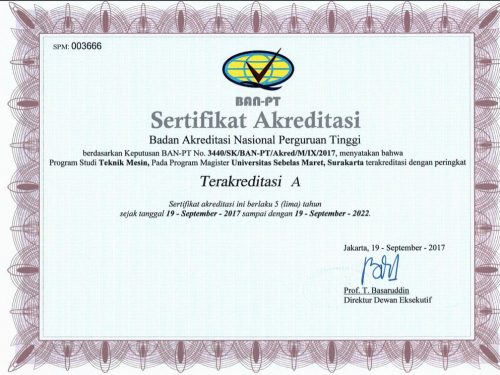
Credits
42 SKS
Time to Complete
2 YEARS
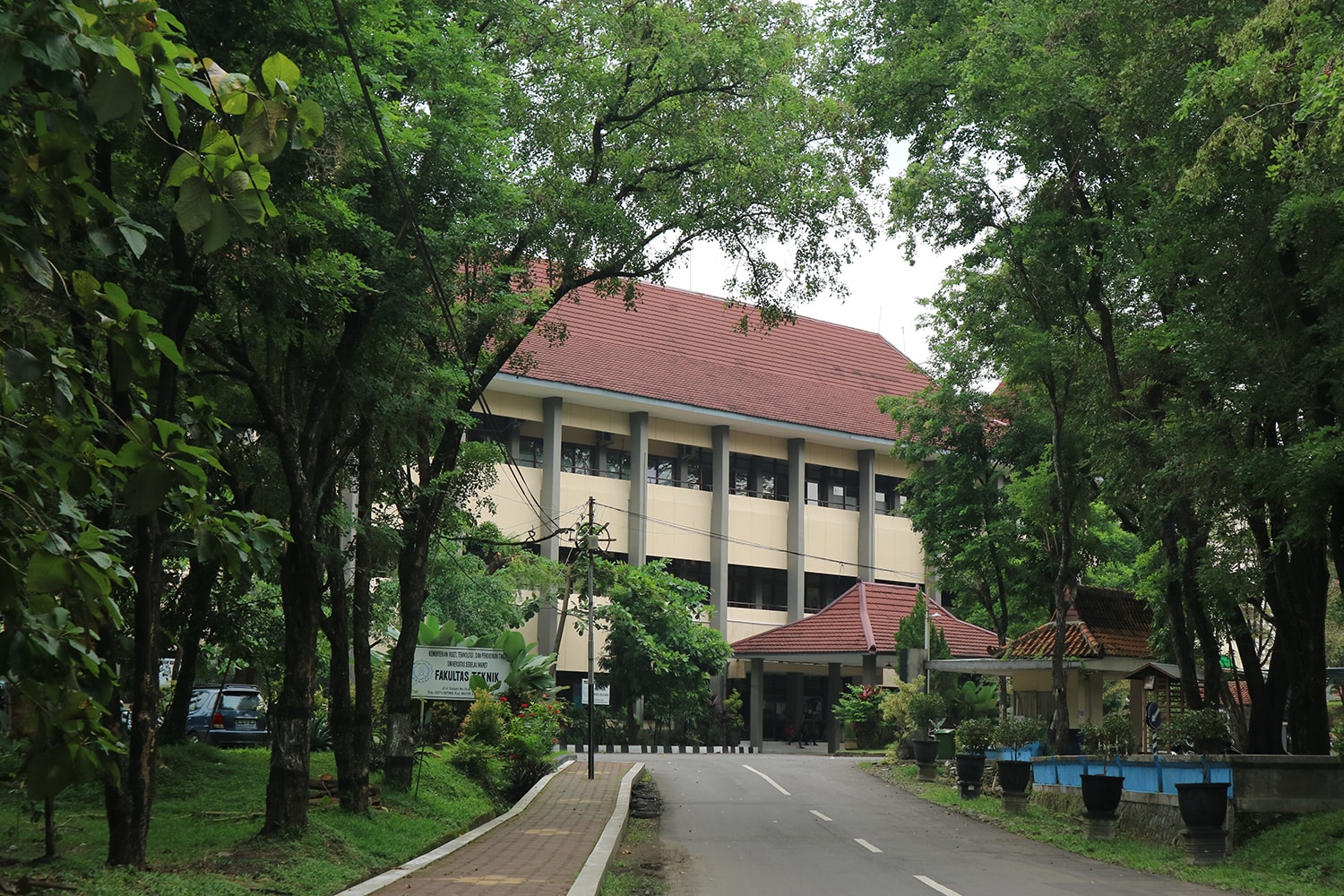
Vision
The vision of Master Programme in Mechanical Engineering, UNS, is to become excellent mater programme in arranging education in the area of mechanical engineering, especially for energy conversion technology and materials technology for construction of renewable energy recognised both nationally and internationally.
Mision
The missions of Master Programme in Mechanical Engineering, UNS, are as follows:
- To perform learning and teaching for Master programme with the focus on energy conversion technology and materials technology for construction of renewable energy.
- To produce research in the area of energy conversion technology and materials technology for construction of renewable energy.
- To establish community services using results of the research.
Aims
The aims of Master Programme in Mechanical Engineering, UNS, are as follows:
- Producing doctors in the area of mechanical engineering which have expertise in the area of energy conversion technology and materials technology for construction of renewable energy.
- Producing articles, models, and devices for renewable energy by utilising local materials.
- Producing research dedicated for society.
Profile and Description of Graduates Profile Master Programme in Mechanical Engineering
Profile | Profile Description |
Researcher | As a researcher, who can design, conduct and manage research and can analyze and interpret the results of the research. |
Academics | As Academics, able to develop, implement and test in the field of renewable energy and supporting renewable energy materials. |
Technopreneur | As Technopreneur, who can develop products, seek funding and market the products produced. |
Engineer | As an engineer, who can develop processes and products that can be utilized in the field of work. |
Consultant | As a consultant, who is able to identify, formulate and solve problems, especially in the field of mechanical engineering with a multi-disciplinary approach. |
Learning Outcomes
ATTITUDE | |
S1 | Commit to ethics & the profession. |
S2 | Able to carry out a lifelong learning process. |
S3 | Able to work together in teams and have social sensitivity and care for the community and the environment |
GENERAL SKILLS | |
K1 | Able to solve engineering and technological problems and design mechanical systems and components by utilizing other fields of science (if needed) and pay attention to economic, health and safety, public, cultural, social and environmental factors. |
K2 | Able to do deepening and/or scientific expansion to make original contributions and to be tested through independent observance rules in specific fields relevant to mechanical systems. |
K3 | Able to formulate new ideas (new research questions) from the results of research carried out for the development of technology relevant to mechanical systems. |
K4 | Able to adapt changes in science, knowledge, and technology that occur in the implementation process and research substance in specific fields that are relevant to mechanical systems |
KNOWLEDGE | |
P1 | Mastering engineering science theory, engineering design theory, and the latest methods and technologies that are relevant to mechanical systems. |
P2 | Able to criticize and provide input for improvement from a scientific perspective on the policy of solving renewable energy problems and supporting materials for renewable energy as outlined in the form of scientific work. |
SPECIAL SKILL | |
KK | Able to apply “engineering software” for design/analysis/ simulation in the field of new renewable energy and supporting materials for new renewable energy |
Semester Learning Plan (RPS)
Semester learning plan is a document containing target of the subjects, contents of the subject and detailed learning plan in a semester. This should be informed by Lecturer in the beginning of class.
For lecturer, it is mandatory to upload RPS on OCW before class starts. You can download the template here.
Curriculum
The study load according to the curriculum of Master Program in Mechanical Engineering is 40 SKS in which the students are expected to finish in 4 semesters. Courses are conducted in 1st and 2nd semesters while thesis and academic publication shall be finished in 3rd and 4th semesters. Master Program in Mechanical Engineering, UNS, consists of two research areas:
- Renewable energy.
- Advanced materials for supporting renewable energy.
Curriculum for Renewable Energy
Curriculum for Advanced Materials
Semester 1
- Engineering Analysis I (3 SKS)
- Engineering Analysis II (3 SKS)
- Renewable Energy (3 SKS)
- Advanced Engineering Materials (3 SKS)
- Research Methodology and Writing Proposal (3 SKS)
Semester 2
- Advanced Energy Analysis (3 SKS)
- Energy Conversion Experiment Design (3 SKS)
- Elective Course 1 (3 SKS)
- Elective Course 2 (3 SKS)
- Seminar and Exam Proposals (3 SKS)
Semester 3
- Elective Couse 3 (3 SKS)
- Thesis Progress Seminar and Scientific Publication (4 SKS)
Semester 4
- Thesis Examination (3 SKS)
Elective Course
- Applied CFD
- Heat Exchanger and Chemical Process
- Biofuels and Alternate Fuels
- Nano Material Production Technology for Energy Conversion
- Characterization of Nano Semiconductor Materials
- Advanced Cooling Techniques
- Advanced two-phase flow
- Advanced Solar Energy and Applications
- Micro / Mini Hydro and Applications
- Pyrolysis and Gasification
- Internal Combustion Engine
- Wind Energy and Applications
- Nano Fluid Technology
- Piezoelectric Based Energy Conversion
- Thermoelectric Based Energy Conversion
- Energy Conversion Based on Photovoltaics
- Advanced Combustion Techniques
- Optimization of Surfactant and Coloring Technology
- Capita Selekta Energy Conversion
Semester 1
- Technical Analysis I (3 SKS)
- Technical Analysis II (3 SKS)
- Renewable energy (3 SKS)
- Advanced Engineering Materials (3 SKS)
- Research Methodology and Writing Proposal (3 SKS)
Semester 2
- Material Characterization (3 SKS)
- Manufacturing Technology and Material Engineering (3 SKS)
- Elective Course 1 (3 SKS)
- Elective Course 2 (3 SKS)
- Seminar and Exam Proposal (3 SKS)
Semester 3
- Elective Couse 3 (3 SKS)
- Thesis Progress Seminar and Scientific Publication (4 SKS)
Semester 4
- Thesis Examination (3 SKS)
Elective Course
- Advanced Material Strength Mechanics
- Advanced Composite Materials
- Polymeric Materials
- Ceramic and Glass Materials
- Advanced Casting Techniques
- Failure Analysis
- Formation Techniques
- Experimental Vibrations and Damping
- Surface Engineering and Heat Treatment
- Advanced Welding Techniques
- Corrosion
- Simulation of Material Strength
- Biomedical Material
- Capita Selekta Supporting Materials for Renewable Energy Construction
- Physical Metallurgy
- Magnetic Simulation
Download Panduan Kurikulum S2
research
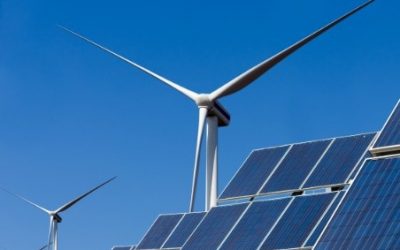
Energy Conversion
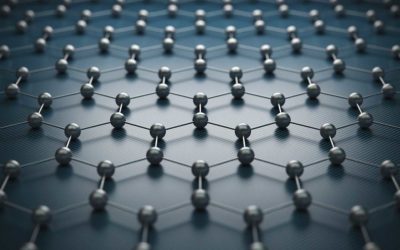
Advanced Materials For Renewable Energy
Contact Us:
Address : Ir Sutami no 36 A
Phone : +6271632163
Email: mesin@ft.uns.ac.id | unsmesin@gmail.com
© 2019 Teknik Mesin UNS.
